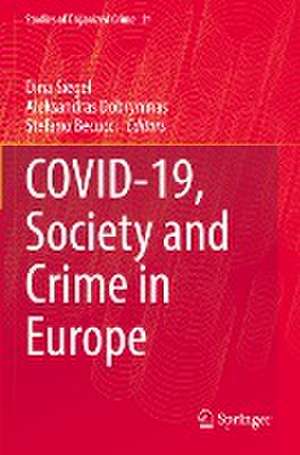Covid-19, Society and Crime in Europe: Studies of Organized Crime, cartea 21
Editat de Dina Siegel, Aleksandras Dobryninas, Stefano Becuccien Limba Engleză Paperback – 31 oct 2023
| Toate formatele și edițiile | Preț | Express |
|---|---|---|
| Paperback (1) | 892.28 lei 6-8 săpt. | |
| Springer International Publishing – 31 oct 2023 | 892.28 lei 6-8 săpt. | |
| Hardback (1) | 898.43 lei 6-8 săpt. | |
| Springer International Publishing – 30 oct 2022 | 898.43 lei 6-8 săpt. |
Din seria Studies of Organized Crime
- 15%
 Preț: 643.16 lei
Preț: 643.16 lei -
 Preț: 394.51 lei
Preț: 394.51 lei - 15%
 Preț: 636.12 lei
Preț: 636.12 lei - 15%
 Preț: 642.03 lei
Preț: 642.03 lei - 15%
 Preț: 646.62 lei
Preț: 646.62 lei - 15%
 Preț: 650.86 lei
Preț: 650.86 lei - 18%
 Preț: 790.14 lei
Preț: 790.14 lei - 15%
 Preț: 637.59 lei
Preț: 637.59 lei - 18%
 Preț: 889.92 lei
Preț: 889.92 lei - 15%
 Preț: 641.03 lei
Preț: 641.03 lei - 15%
 Preț: 524.36 lei
Preț: 524.36 lei - 18%
 Preț: 781.94 lei
Preț: 781.94 lei - 15%
 Preț: 637.46 lei
Preț: 637.46 lei - 18%
 Preț: 1853.06 lei
Preț: 1853.06 lei - 18%
 Preț: 1115.14 lei
Preț: 1115.14 lei - 15%
 Preț: 642.51 lei
Preț: 642.51 lei -
 Preț: 384.86 lei
Preț: 384.86 lei - 15%
 Preț: 641.20 lei
Preț: 641.20 lei
Preț: 892.28 lei
Preț vechi: 1088.15 lei
-18% Nou
Puncte Express: 1338
Preț estimativ în valută:
170.76€ • 177.62$ • 140.97£
170.76€ • 177.62$ • 140.97£
Carte tipărită la comandă
Livrare economică 15-29 aprilie
Preluare comenzi: 021 569.72.76
Specificații
ISBN-13: 9783031135644
ISBN-10: 3031135644
Pagini: 321
Ilustrații: XXII, 321 p. 37 illus., 36 illus. in color.
Dimensiuni: 155 x 235 mm
Greutate: 0.48 kg
Ediția:1st ed. 2022
Editura: Springer International Publishing
Colecția Springer
Seria Studies of Organized Crime
Locul publicării:Cham, Switzerland
ISBN-10: 3031135644
Pagini: 321
Ilustrații: XXII, 321 p. 37 illus., 36 illus. in color.
Dimensiuni: 155 x 235 mm
Greutate: 0.48 kg
Ediția:1st ed. 2022
Editura: Springer International Publishing
Colecția Springer
Seria Studies of Organized Crime
Locul publicării:Cham, Switzerland
Cuprins
Introduction.- Part 1. East and Central Europe.- The Covid-19 Pandemic Crisis and its Impact on Crime Rates in Bulgaria.- Covid-19 and Crime in Serbia.- Pandemic and Infodemic in Lithuania.- Crime, Law Enforcement and Rule of Law in Time of the Covid-19 Pandemic in Poland.- Covid-19, Crime and Social Control in Slovenia.- Influence of Covid-19 Pandemic on Social Control, Crime Patterns and Life in Prison in Hungary.- Part 2. South Europe.- Crime, Criminal Policy and Social Reactions in Greece in the Era of Covid-19.- The Covid-19 Pandemic in Italy: the Effects on Society and Crime.- Social and Criminal Impact of Covid-19 in Spain.- How did the Pandemics Shaped Crime and Justice in Portugal?.- Part 3. West and North Europe.- The Covid-19 Pandemic in Germany. Prevention Measures, Protest and the Impact on Crime Rates.- Covid-19: Policies, Trust and Crime in the Netherlands.- Patterns of Crime during the Covid-19 Pandemic in Belgium.- Violent Crime in Finland during the First Year of theCovid-19 Pandemic.- Violent Crime and Covid-19 in England and Wales.- Impact of the Covid-19 Pandemic on Crime in Switzerland in 2020. A First Assessment.- Conclusion.- Index.
Notă biografică
Dina Siegel is Professor of Criminology and Head of the department of Criminology at the Willem Pompe Institute for Criminal Law and Criminology at Utrecht University, The Netherlands. She has conducted research and published on crimes of mobility, transnational organized crime, Russian Mafia, human smuggling, human trafficking, the role of women in organized crime, green and cultural criminology.
Aleksandras Dobryninas is the professor of Sociology, Chair of the Department of Criminology at the Institute of Sociology and Social Work, Faculty of Philosophy, Vilnius University. His research interests include theoretical aspects of criminological knowledge, corruption, violent crime, media and crime, public attitude towards criminal justice.
Stefano Becucci is Associate Professor of Sociology at the University of Florence. His research interests are on forms of inclusion and exclusion of migrants in the new society, smuggling and trafficking of human beings and organized crime in Italy and in other European countries.
Aleksandras Dobryninas is the professor of Sociology, Chair of the Department of Criminology at the Institute of Sociology and Social Work, Faculty of Philosophy, Vilnius University. His research interests include theoretical aspects of criminological knowledge, corruption, violent crime, media and crime, public attitude towards criminal justice.
Stefano Becucci is Associate Professor of Sociology at the University of Florence. His research interests are on forms of inclusion and exclusion of migrants in the new society, smuggling and trafficking of human beings and organized crime in Italy and in other European countries.
Textul de pe ultima copertă
This volume analyzes the development of the reactions to Covid-19 by governments, the public and the crime patterns in 16 European countries. All countries are members of the European Union and share common European norms and values, but the Covid-19 pandemic can serve as an example of how these norms and values are interpreted differently with regard to people’s trust in public institutions, governmental control strategies, dealing with fear, anxiety and other emotional responses to the new virus, crime patterns and law enforcement priorities to prevent and combat them. The volume provides empirical data based on available statistics, media analysis and qualitative data from interviews and observations, and examines the similarities and differences in crime patterns and the consequences for local communities and law enforcement priorities.
Caracteristici
First volume in criminology on Covid-19 and Crime that brings together a group of top scholars Diverse research methods mean this will appeal to quantitative and qualitative researchers Multidisciplinary contributions make text useful for social scientists, policy-makers
